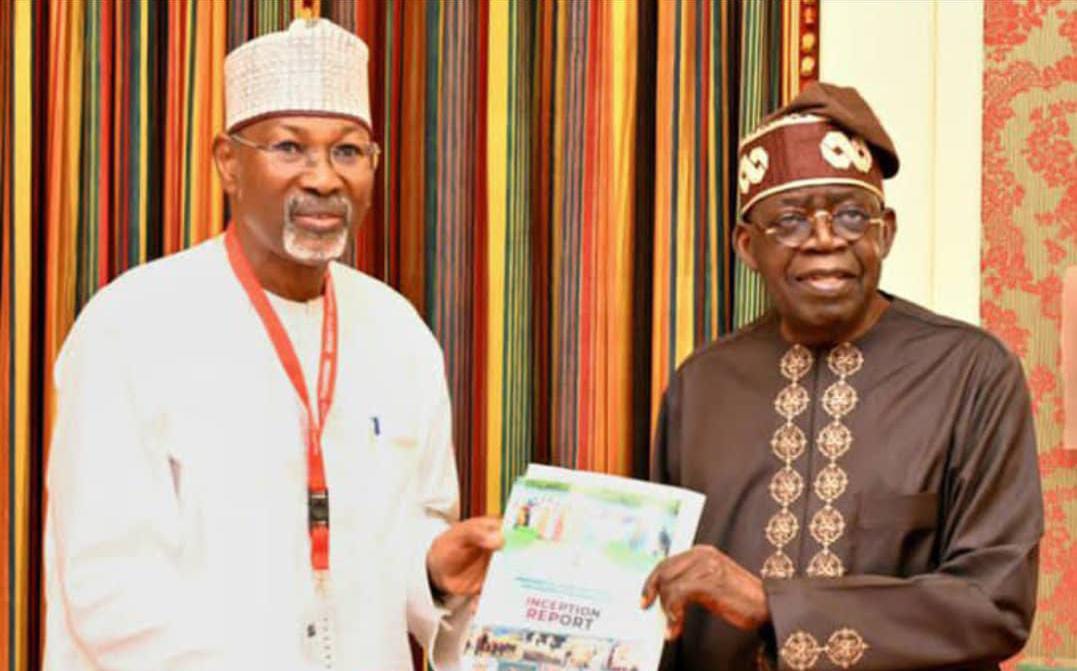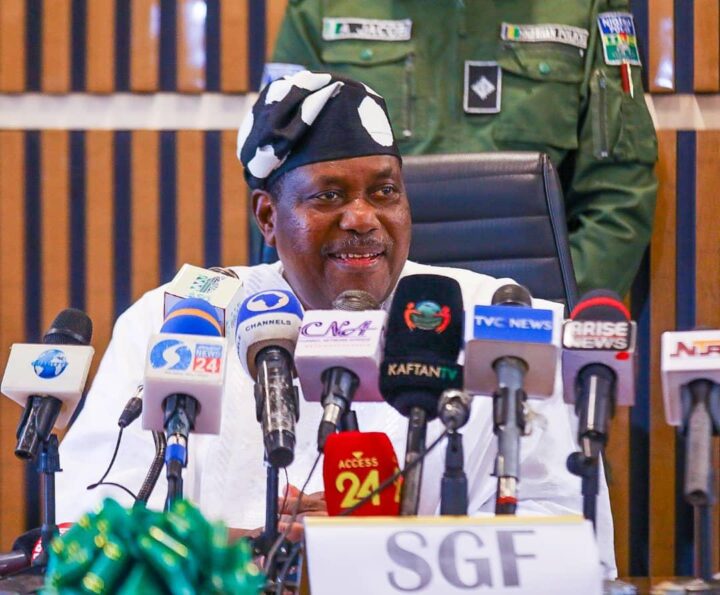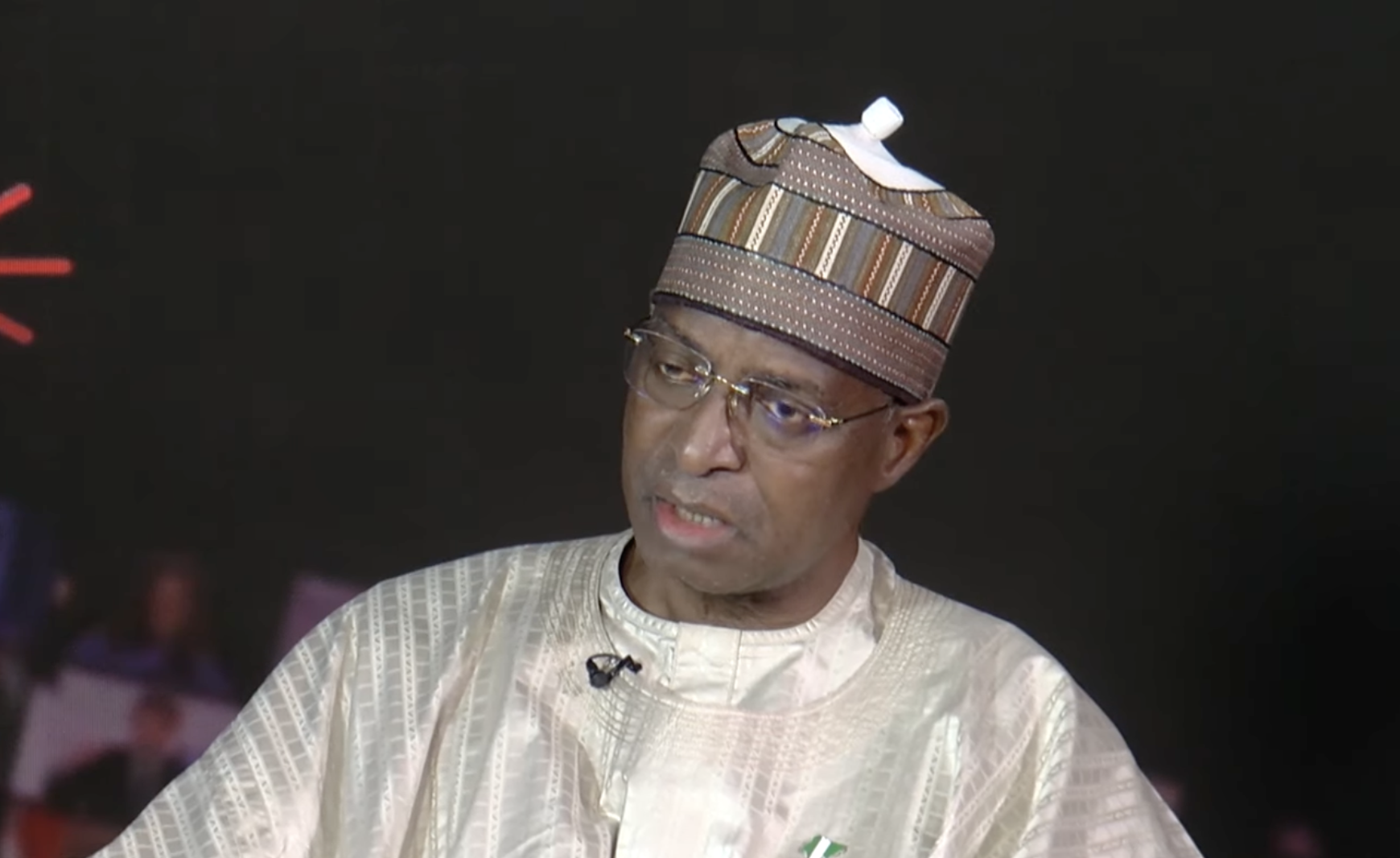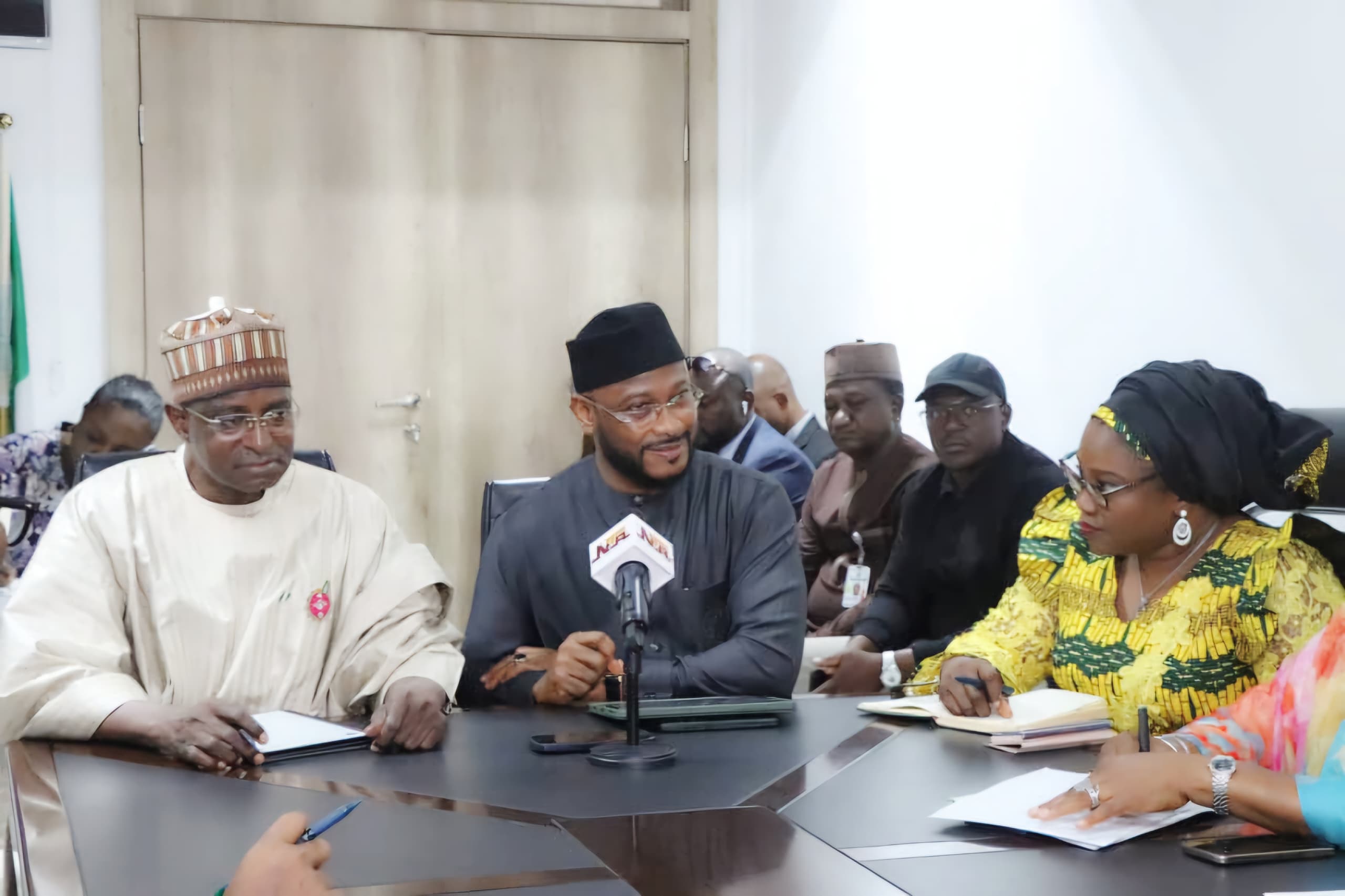Several months after its establishment, Nigeria’s federal ministry of livestock development (FMLD) still lacks a website.
Checks by TheCable showed that it is the only ministry in Nigeria without a website. There are also no designated official social media accounts for the ministry.
In July 2024, during the inauguration of the presidential committee on livestock reforms, President Bola Tinubu hinted at the creation of the FMLD.
“This sector will boost agricultural productivity, enhance export opportunities and stimulate economic growth by fostering a robust value chain that benefits farmers, processors, herders, distributors and consumers alike,” Tinubu said.
Tinubu had set up the presidential livestock reforms implementation committee in September 2023 to revamp the livestock industry and address the perpetual crisis between pastoralists and farmers over access to land, pasture and water.
The committee was established after the president received a report from the national conference on livestock reforms and mitigation of associated conflicts in Nigeria.
The panel had given the president 21 recommendations, including the creation of a ministry of livestock resources.
The president announced that he would chair the committee, while Attahiru Jega, former INEC chairman, would serve as co-chair.
In September, when the committee’s inception report was presented to Tinubu, Jega said the committee provided detailed guidance on the proposed livestock development ministry.

“As you are aware, Mr. President has already announced the establishment of Federal Ministry of Livestock Development, and in our report, we have provided detailed guidance in terms of how to set up this ministry, what the structure of the ministry should be, what the mission, the vision, the objectives, the functions of the ministry should be, how many departments it should have, how many technical departments, that is, how many service units should it have, how many institutes should it have, how many research centers it should have, and so on and so forth,” Jega told journalists after meeting with the president.
There is, however, no public mention of the exact date of the ministry’s establishment; but in October 2024, Tinubu announced Idi Mukhtar Maiha as head of the livestock ministry, which was carved out of the ministry of agriculture.
It remains unclear whether the ministry was established when Tinubu hinted at its creation, when a minister was appointed to the portfolio, or at another point in time.
Before Maiha came on board, Chinyere Akujobi, announced as a permanent secretary on June 28, 2024, oversaw the ministry’s affairs. On July 13, Tinubu approved the appointment of Idris Ajimobi as his senior special assistant (SSA) on livestock development (office of the president).
The ministry’s coming on board, in addition to the prior creation of three new ministries, especially at a time when the clamour for reduced governance costs was intense, drew much criticism.
Justifying the ministry’s establishment, Lateef Fagbemi, minister of justice and attorney-general of the federation, said the move is needed to enhance protein production and increase employment opportunities and government revenue.
Speaking to journalists at the state house, Abuja, after the federal executive council (FEC) meeting of July 10, Fagbemi explained that the agriculture ministry would focus on other responsibilities.
“President formally informed Council that a ministry known as Ministry of Livestock Development is being established and this is because he believes that the Ministry of Agriculture should be broken into two, one concentrating on livestock development because of what we stand to achieve in terms of protein, in terms of employment, in terms earnings for the government and how this one will rub off on the lives of an ordinary Nigerian citizen,” Fagbemi said.
“I have talked about this livestock, and I said one, apart from improving the protein intake of our people, it also provides money for government because it’s going to be on large scale that will ensure money or revenue for government, and there is also going to be increased employment opportunities for people. So these are some of the areas that I think I should clear.”
A DIGITAL ABSENCE

In an era of rapid technological advancement, government agencies are expected to maintain robust online presence. The absence of a dedicated website for the ministry of livestock development stands out as a critical oversight.
For a ministry charged with driving modernisation and investment, an official website is not a mere accessory but an essential platform for public engagement, transparency, and accountability.
Web searches show there are no platforms where the ministry can be contacted.
TheCable contacted Ajimobi to enquire about the digital lacuna but got no response to the query. A link on his X handle to access his office initially presented an error message: “This account has been suspended”. After TheCable contacted him, the website became active, but no substantial information was available.
However, Jega told TheCable that “the ministry is new and trying to find its footing. They may soon have a website”. He directed the reporter to the website for the presidential livestock reforms implementation for consultation.
On September 24, Nyesom Wike, FCT minister, said Tinubu had directed the refurbishing of the former ministry of agriculture building for the newly created livestock ministry.
During an inspection tour of the building, Wike said the structure passed its integrity test.
“Well, it is the former Ministry of Agriculture, and we have a directive from Mr President to go and immediately refurbish the place and furnish it for the new Ministry of Livestock, and that is why we went there to see things for ourselves. We will get some companies to come and look at it, and quote for it. It is an emergency work because the creation of the Ministry of Livestock is a welcome development, and you can see people are happy, waiting for it to start,” Wike said.
Meanwhile, Maiha told the national assembly during the budget defence session in January that the ministry is being temporarily housed by the office of the secretary to the government of the federation.
FG MANDATES ALL MDAs TO HAVE FUNCTIONAL WEBSITES

In a circular dated December 10, 2017, made available on the website of the office of the secretary-general of the federation (OSGF), the federal government said: “It is required that the MDAs have functional websites to support the implementation of the Ease of Doing Business initiative.”
It added that it has observed most government websites do not contain requisite baseline information investors could easily access to establish their businesses in Nigeria. This, it explained, is contrary to the intent of Executive Order E001 designed to promote transparency and efficiency in Nigeria’s business environment.
“Towards this end, the Federal Government has developed a scorecard for ranking MDA’s websites in ensuring that MDAs comply with necessary Standards for government website, to boost the Operationalization of the Executive Order,” the circular reads.
The National Information Technology Development Agency (NIDTA) outlines the standards and guidelines for government websites here.
The ministry of communication, innovation and digital economy, in October 2023, announced the e-government initiative. The ministry set four key goals — connected government, informed citizenry, open data, and open government partnership — to drive the adoption of e-government across all MDAs.
“Leveraging on technology advances; the Ministry has initiated projects to ensure that citizens and businesses have easy access to government services. These initiatives are prioritized to drive the adoption of e-government across the MDAs, which will improve service delivery, drive transparency, accountability and good governance,” the ministry wrote on its website.
FG TO FULLY DIGITISE CIVIL SERVICE BY 2025
In 2021, the federal government launched the Federal Civil Service Strategy and Implementation Plan (FCSSIP 2021-2025). The document noted that the manual process of storing and processing information is characterised by high operational costs, with stationary alone gulping N5 billion annually (2 percent of the national budget); hence, the civil service is committed to the full digitalisation and automation of the work process across MDAs.
The priorities under digitalisation for the new plan include the creation of an official email address for all civil and public servants, launching of service-wide professional ICT staff skills upgrade, accelerating digitisation of content, and procuring and implementing content services and functional solutions.
Folasade Yemi-Esan, former head of the civil service, said in December 2023 that in line with the FCSSIP 2021-2025, MDAs have no reason not to go digital “having been given the opportunity to ensure adequate budgetary allocation in the 2024 budget”.
She urged MDAs to leverage technology to drive the national goals to meet the 2025 deadline.
WHAT HAS THE MINISTRY BEEN UP TO?

In February, Maiha said the ministry aims to double livestock’s contribution to Nigeria’s gross domestic product (GDP) from $32 billion to $74 billion by 2035.
In his interview appearances, Maiha said that since its creation, there have been misconceptions about the ministry.
“This ministry is not about cattle; it is about farmable animals,” Maiha said, explaining that it covers animals starting from bees, snails, poultry, rabbitry, goat, sheep, pigs, donkeys, horses, camels, cows and cattle.
Maiha said that in the immediate term, the ministry’s priorities include breed enhancement, increased production of feed and fodder, infrastructure development, disease and health management, and providing an enabling environment for private sector operators, including the provision of ranches, dairy farms, abattoir operators, and logistics.
He explained that the livestock sector is mainly informal and in private hands, hence the need for inclusivity in the ministry’s plans. He added that the ministry has embarked on “hundreds of stakeholder engagements” since its creation.
“You can’t do otherwise but deal with those who own those assets. The national herd, the repository of our animal protein in this country, is mostly in private hands. We are just going to enhance their capacity to manage it a better way,” he said.
For budgetary provisions, the federal government earmarked N11.8 billion in the 2025 budget for the ministry’s take-off, with N10 billion for capital expenditure and N1.8 billion for overhead costs. The national assembly argued that the sum was inadequate.

In January, Dauda Lawal, governor of Zamfara, paid a courtesy visit to Maiha. Lawal said that as an agrarian state, Zamfara plays a significant role in the mandate of the FMLD, pledging his administration’s willingness to collaborate with the ministry.
Speaking during the first Benue Livestock Summit 2025, Maiha said the federal government, as well as the governments of Qatar and Brazil, are interested in livestock development in Benue.
He said the ministry intends to reactivate grazing reserves and turn them into ranches. According to Maina, there are currently 417 grazing reserves in Nigeria.
The minister was also in attendance at the inauguration of the Ngarannam Livestock Improvement and Ranch Settlement in the Mafa LGA of Borno state in January.
He described the project as a model for sustainable livestock development in Nigeria and urged other states to adopt similar strategies.
In February, Maiha said he federal government has initiated plans to digitise all grazing routes in the country “to know where they are, who is using them, and whether there is encroachment on those cattle routes”.
But without a website, stakeholders ranging from local farmers and industry investors to policy analysts, investors and international development partners are forced to rely on press releases and fragmented news reports to track the ministry’s activities.
The lack of centralised digital communication hampers the ministry’s ability to disseminate accurate, up-to-date information about policy initiatives, project progress, and investment opportunities.
The absence of an online platform can create uncertainty, discourage investment, and ultimately impede the inflow of capital needed to realise the ministry’s ambitious reform agenda.


![[OPINION] How relevant are monarchies in contemporary governance system? - Jide Ojo](/media/k2/items/cache/9e360a0883f00dbeb4edecb51ea557e4_Generic.jpg)
![[OPINION] Naira-for-petroleum deal fails - Lekan Sote](/media/k2/items/cache/6f06a29d8a9fc8fd5855e78687ea4a2a_Generic.jpg)


![[OPINION] ACCIOBA 1979: Many years later, technology brings them together - Okoh Aihe](/media/k2/items/cache/1820f232fb5421e9c45765db31583c78_Generic.jpg)

![[OPINION] Plaudits for two distinguished Nigerians - Bola BOLAWOLE](/media/k2/items/cache/e15bcf9ebb5d97e8b46f69cec6f39223_Generic.jpg)
![[STATEHOUSE PRESS RELEASE] President Tinubu Reconstitutes NNPC Limited Board, Appoints New Chairman, Group CEO](/media/k2/items/cache/6af30bfdf3d4edbf3cb0c3c6705d3a57_Generic.jpg)
![[OPINION] Why Nigerian Governments Pay Lip Service to Civil Service Reforms - Tunji Olaopa](/media/k2/items/cache/712960cdab797c3c40fff4ab7a21a196_Generic.jpg)